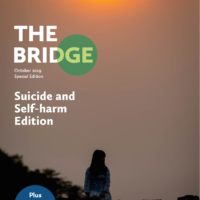Self-Harm
-

2019 Judy Dunn National Conference ‘Suicide and self-harm in young people’ – Prof. Christian Schmahl
The 2019 Judy Dunn Conference focused on ‘Suicide and self-harm in young people’. Prof. Christian Schmahl on the ‘Neurobiology of self-harm in BPD’. ACAMH members can now receive a CPD certificate for watching this recorded lecture. Simply email membership@acamh.org with the day and time you watch it, so we can check the analytics, and we’ll email you your certificate.
Read more -

Prof. Paramala J Santosh ‘Mobile applications and wearable devices in assessing suicide risk’
ACAMH members can now receive a CPD certificate for watching this recorded lecture. Simply email membership@acamh.org with the day and time you watch it, so we can check the analytics, and we’ll email you your certificate.
Read more -

Epidemiology of self-harm – Prof. Dr. Paul Plener
Sorry, but you do not have permission to view this content.Read more -

World Mental Health Day 2019: focus on Suicide Prevention
The theme of this year’s World Mental Health Day is suicide and suicide prevention. Our Vision is ‘Sharing best evidence, improving practice’, and to this end we urge you to take a look at the learning opportunities on our website and to share with your networks.
Read more -

Clare Stafford ,CEO Charlie Waller Memorial Trust joins amazing line-up
We are delighted to welcome Clare Stafford, CEO Charlie Waller Memorial Trust, to be part of the 2019 Judy Dunn National Conference on ‘Suicide and Self-Harm in Young People.
Read more -

In Conversation… Dr. Trudie Roussow
In this podcast, Dr. Trudie Roussow discusses Mentalisation Based Treatment for adolescents (MBT-A), how it differs from MBT for adults, and how this type of intervention can be utilised for those who self-harm.
Read more -

In Conversation… Suicide and Self-harm with Dr Abigail Russell
Abigail discusses her paper on inflammation and self-harm, its findings and implications moving forward. As well as the cohort study (ALSPAC), to school interventions and creating change through national dialogue.
Read more -

Suicide and Self-Harm Special Edition
The National Confidential Enquiry into Suicide and Safety in Mental Health Annual Report (2018) highlighted that suicide in the under 20’s is rising generally and that the number of suicides rises towards late teens.
Read more -

Suicide and Self-harm Edition Editorial
The National Confidential Enquiry into Suicide and Safety in Mental Health Annual Report (2018) highlighted that suicide in the under 20’s is rising generally and that the number of suicides rises towards late teens.
Read more -

DBT-A reduces self-harming behaviours by improving feelings of hopelessness
Professor Lars Mehlum and colleagues have completed a prospective 3-year follow-up study, which showed that DBT-A has enduring effects in terms of reducing self-harm frequency in adolescents compared to EUC.
Read more